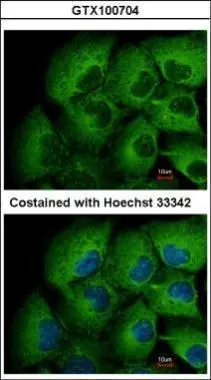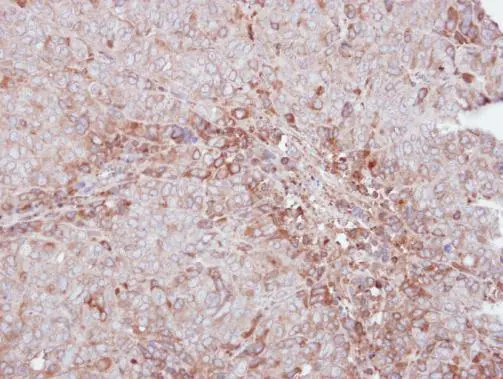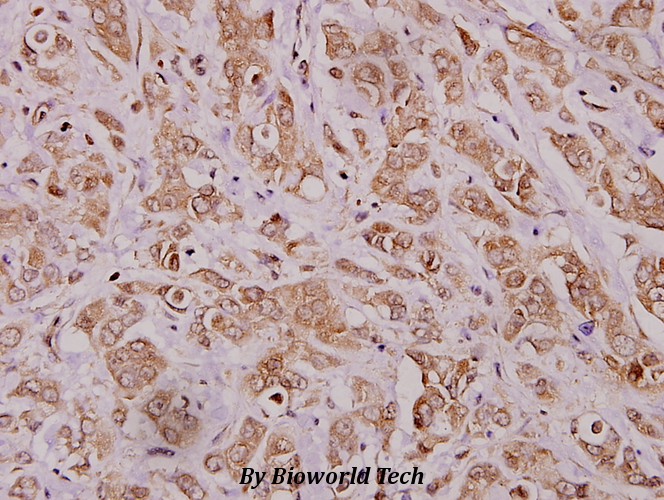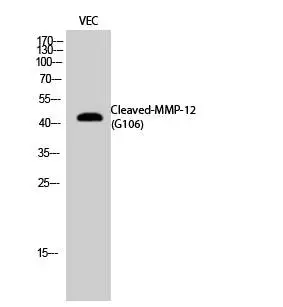![Whole cell extract (30 μg) was separated by 10% SDS-PAGE, and the membrane was blotted with MMP12 antibody [N3C1], Internal (GTX100704) diluted at 1:1000. The HRP-conjugated anti-rabbit IgG antibody (GTX213110-01) was used to detect the primary antibody. Whole cell extract (30 μg) was separated by 10% SDS-PAGE, and the membrane was blotted with MMP12 antibody [N3C1], Internal (GTX100704) diluted at 1:1000. The HRP-conjugated anti-rabbit IgG antibody (GTX213110-01) was used to detect the primary antibody.](https://www.genetex.com/upload/website/prouct_img/normal/GTX100704/GTX100704_39995_20220520_WB_w_23060100_277.webp)
Whole cell extract (30 μg) was separated by 10% SDS-PAGE, and the membrane was blotted with MMP12 antibody [N3C1], Internal (GTX100704) diluted at 1:1000. The HRP-conjugated anti-rabbit IgG antibody (GTX213110-01) was used to detect the primary antibody.
MMP12 antibody [N3C1], Internal
GTX100704
ApplicationsImmunoFluorescence, Western Blot, ImmunoCytoChemistry, ImmunoHistoChemistry, ImmunoHistoChemistry Paraffin
Product group Antibodies
ReactivityHuman, Rat
TargetMMP12
Overview
- SupplierGeneTex
- Product NameMMP12 antibody [N3C1], Internal
- Delivery Days Customer9
- Application Supplier NoteWB: 1:500-1:3000. ICC/IF: 1:100-1:1000. IHC-P: 1:100-1:1000. *Optimal dilutions/concentrations should be determined by the researcher.Not tested in other applications.
- ApplicationsImmunoFluorescence, Western Blot, ImmunoCytoChemistry, ImmunoHistoChemistry, ImmunoHistoChemistry Paraffin
- CertificationResearch Use Only
- ClonalityPolyclonal
- Concentration1 mg/ml
- ConjugateUnconjugated
- Gene ID4321
- Target nameMMP12
- Target descriptionmatrix metallopeptidase 12
- Target synonymsHME, ME, MME, MMP-12, macrophage metalloelastase, matrix metallopeptidase 12 (macrophage elastase), matrix metalloproteinase 12 (macrophage elastase)
- HostRabbit
- IsotypeIgG
- Protein IDP39900
- Protein NameMacrophage metalloelastase
- Scientific DescriptionProteins of the matrix metalloproteinase (MMP) family are involved in the breakdown of extracellular matrix in normal physiological processes, such as embryonic development, reproduction, and tissue remodeling, as well as in disease processes, such as arthritis and metastasis. Most MMPs are secreted as inactive proproteins which are activated when cleaved by extracellular proteinases. It is thought that the protein encoded by this gene is cleaved at both ends to yield the active enzyme, but this processing has not been fully described. The enzyme degrades soluble and insoluble elastin. It may play a role in aneurysm formation and studies in mice suggest a role in the development of emphysema. The gene is part of a cluster of MMP genes which localize to chromosome 11q22.3. [provided by RefSeq]
- ReactivityHuman, Rat
- Storage Instruction-20°C or -80°C,2°C to 8°C
- UNSPSC41116161


![MMP12 antibody [N3C1], Internal detects MMP12 protein at cytoplasm in human lung adenocarcinoma by immunohistochemical analysis. Sample: Paraffin-embedded human lung adenocarcinoma. MMP12 antibody [N3C1], Internal (GTX100704) diluted at 1:500.
Antigen Retrieval: Trilogy? (EDTA based, pH 8.0) buffer, 15min MMP12 antibody [N3C1], Internal detects MMP12 protein at cytoplasm in human lung adenocarcinoma by immunohistochemical analysis. Sample: Paraffin-embedded human lung adenocarcinoma. MMP12 antibody [N3C1], Internal (GTX100704) diluted at 1:500.
Antigen Retrieval: Trilogy? (EDTA based, pH 8.0) buffer, 15min](https://www.genetex.com/upload/website/prouct_img/normal/GTX100704/GTX100704_39995_20151223_IHC-P_w_23060100_699.webp)








![Whole cell extract (30 μg) was separated by 7.5% SDS-PAGE, and the membrane was blotted with MMP12 antibody [N3C3] (GTX102928) diluted at 1:1000. The HRP-conjugated anti-rabbit IgG antibody (GTX213110-01) was used to detect the primary antibody.](https://www.genetex.com/upload/website/prouct_img/normal/GTX102928/GTX102928_39974_20230303_WB_23030717_292.webp)
